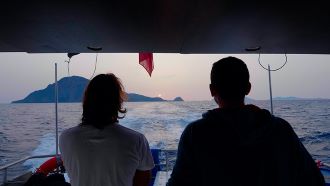
Guardians of the Sea 2022
Distributed by Docuseek2
Produced by Pascaline Geoffroy, Cedric Bonin, and Maxime Owyszer
Directed by Laurent Lutaud
Streaming, 52 mins
College - General Adult
Activism; Environmentalism; Marine Sciences
Date Entered: 11/01/2023
Reviewed by Erica Swenson Danowitz, Chat Reference Librarian; Research/Information Services Librarian/Contractor: Paratext; Retired Reference Librarian, Delaware County Community CollegeGuardians of the Sea is an expository film that documents the voyages of two ships owned and operated by the NGO Sea Shepherd. In the 1980s and 1990s Sea Shepherd gained notoriety when its members boarded Russian and Japanese whaling ships to impede illegal whale hunting. It also enlisted French actress Brigitte Bardot to help cease the cruel slaughtering of baby seals. In the decades since these newsworthy actions, Sea Shepherd has evolved and continues as an entity that strives to stop marine pollution and poaching but within a “more legal framework,” as this film demonstrates.
Set on the Mediterranean Sea which the viewer learns is one of the most endangered and polluted bodies of water on the planet, Guardians of the Sea introduces viewers to volunteers from many different countries who work on two Sea Shepherd ships. These ships monitor illegal fishing or poaching activities that remain prevalent in areas off the Sicilian and Italian coasts despite strict EU regulations against the use of particular types of netting or fishing devices. Sea Shepherd members spy on trawlers/fishing boats who might intend to fish illegally, and they report these forbidden activities to authorities such as the Italian Coast Guard. They also approach fishing boats, greet them, and report suspicious activities when they arise.
In addition to this vigilant work which potentially could turn dangerous, there is a scene where one of the Sea Shepherd ships is confronted by a group of angry fishermen, volunteers also collect trash from the sea and disable illegal fishing devices called Fish Aggregating Devices (FADs). One learns that these devices create their own ecosystems which cause more harm than good. In just a small area of the Mediterranean, fishermen have laid thousands of these FAD gadgets which Sea Shepherd volunteers meticulously take down. One observes that the work is slow and tedious but ultimately results in hundreds of miles of FAD lines being collected and shutdown. Volunteers also pick up mountains of trash and plastic which often entangles and kills wildlife such as turtles or other sea creatures.
This film presents many depressing scenes of dead marine animals, whales/turtles entangled in illegal nets/plastic bags, and poachers who seem to completely disregard the ecological impact of their illicit activities. However, it also conveys an encouraging message through its interviews with numerous Sea Shepherd volunteers who are committed to protecting the oceans and preserving sea life. They often perform tasks that appear almost Sisyphean, but their actions have an impact, and their efforts play a role in curbing the harm caused by polluters and poachers. As one volunteer states, one can think globally but act locally which empowers environmentalism. Scenes of dolphins swimming alongside boats and volunteers hearing elusive whales vocalizing deep in the Mediterranean brighten this film. Guardians of the Sea is available to stream on Docuseek. It is recommended for college courses in such disciplines as conservation, ecology, marine sciences, and oceanography.
Awards:Special Jury Mention at Images sur Mer Festival in France
Published and licensed under the Creative Commons Attribution 4.0 license. Anyone can use these reviews, so long as they comply with the terms of the license.